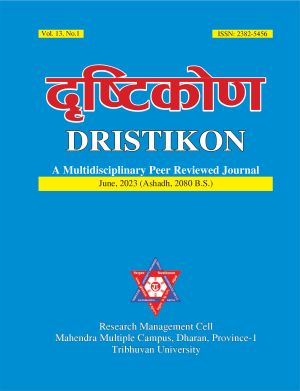Transnational Statelessness in Amitav Ghosh’s The Hungry Tide
DOI:
https://doi.org/10.3126/dristikon.v13i1.56039Keywords:
globalization, transnational Statelessness, refugees, migrant transnationalismAbstract
The paper attempts to examine Amitav Ghosh’s The Hungry Tide as its primary text. It utilizes Steven Vertovec’s idea of “migrant transnationals” as the analytical tool. In doing so, it also uses Anna Jane Gordon’s idea of “statelessness as enslavement” and Mira L. Siegelberg’s definition of “statelessness.” The paper specifically concentrates on how Bangladeshi refugees and (denationalized) people have been exploited /enslaved and how their transnational statelessness (neither Bangladeshi nor Indian) renders them vulnerable. As the refugees were forced to leave their state/political and legitimate home due to post-partition political turmoil and were attacked/ harmed by both the tide and Indian citizens/people in the Sundarbans and in Calcutta /Kolkata. The so-called “lower” class and “lower” caste people from Bangladesh come to the Sundarbans (tide country) where they are treated as illegitimate and invalid, politically, belonging nowhere (deterritorialized). So, these people have been enslaved in India. Ghosh wants to explore, quite faithfully and realistically, this side of inhumanity, which is prevalent in contemporary society.
Downloads
Downloads
Published
How to Cite
Issue
Section
License
© Research Management Cell, Mahendra Multiple Campus, Dharan

